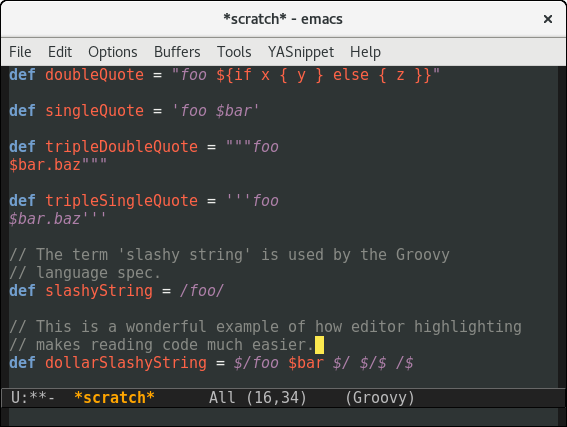I’ve been writing Groovy recently. Groovy has a shockingly flexible string syntax, as I discovered when trying to improve the Emacs mode.
Groovy tries really hard to make you happy. It provides normal strings:
"hello world"and since it’s a recent scripting language, it provides string interpolation too!
def name = "wilfred"
"hello $name"Groovy doesn’t stop there, however. Oh no.
The string interpolation is very flexible. You can access object attributes, or even write arbitrary Groovy expressions.
"hello $user.name"
// Interpolations are challenging to highlight,
// because { } can nest!
"hello ${if (true) { 1 } else { 2 }}"Naturally, you might not always want interpolation. Groovy provides an escaping mechanism, and an additional syntax for this:
// Escaping the $.
"the cost is \$10"
// No interpolation with single-quoted strings.
'the cost is $10'You want multiline strings? Groovy has those too, in both interpolated and raw flavours:
"""hello
world"""
'''hello
world'''These are useful, but sometimes you want to start a line with
""". Groovy lets you escape that:
def foo = """\
line 1 (no newline before this line)
line 2"""Other scripting languages also support a /foo/ syntax. Groovy users
might want this as well, so of course they’re available:
// This is tricky to highlight correctly, because "" is
// an empty string but // begins a comment.
/fo+b{ar,az}/For the brave of heart, you can interpolate into your regular expressions:
// Simple interpolation.
def name = "wilfred"
/user $name/
// However, what if we want to use $ in a pattern?
// This works because $ is not a legal interpolation,
// so it magically falls back to a literal pattern.
/user$/Groovy doesn’t even stop here. What if you have a string with many embedded single-quotes and double-quotes? The interpolated, multiline, dollar-slashy-string is available!
The dollar-slashy-string is so awkward to highlight that even the official docs don’t try to highlight it!
def message = $/Dear ${user.capitalize()},
Thank you for signing up to "Acme's Mailing list".
Kind Regards./$
// This string syntax has its own escaping mechanism:
"foo / /$ bar" == $/foo $/ $/$ bar/$To stake its claim as an incredibly versatile syntax, Groovy strings have one last trick up their sleeves. Strings can be lazily evaluated!
def number = 1
def eagerString = "${number}"
number = 2
assert eagerString == "1"
// However:
def number = 1
def lazyString = "${ -> number}"
assert lazyString == "1"
number = 2
assert lazyString == "2"Needless to say, only a total madman would try to write a syntax highlighter for this:

Groovy is a really neat language that is excellent for glue code. I’ve had a whole lot of fun making it work in Emacs.